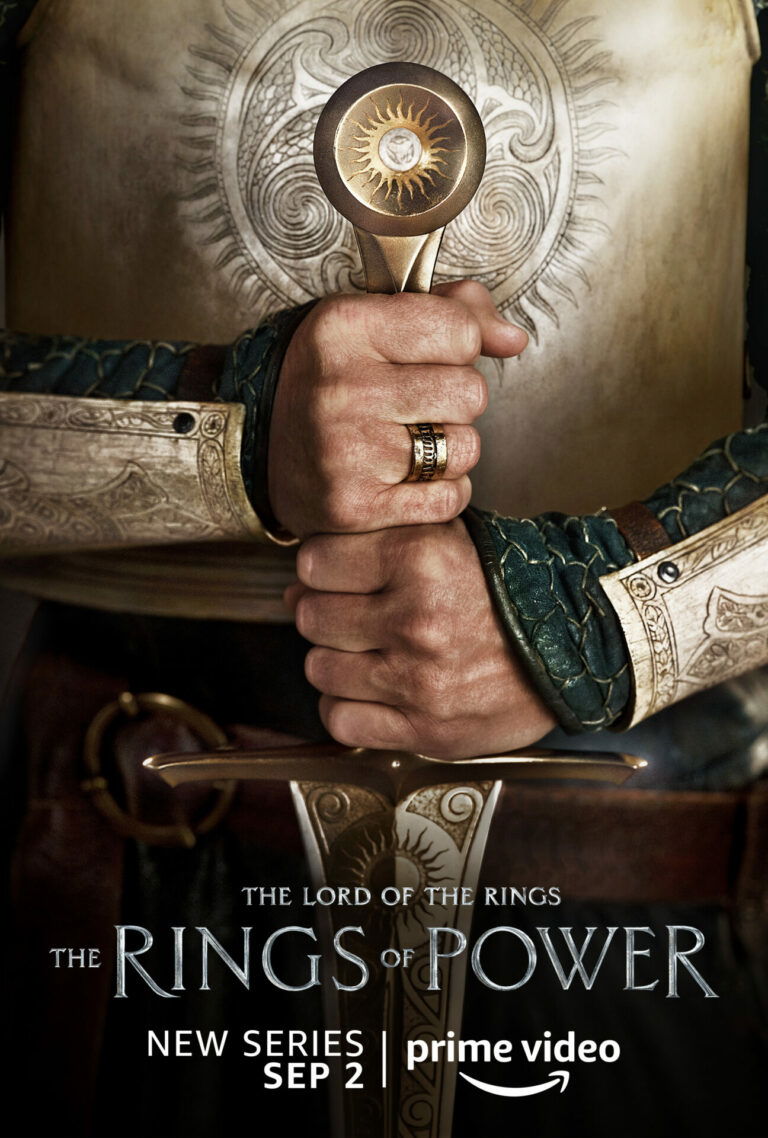"Marred by Gratuitous Violations of Tolkien’s Monotheistic Masterpiece"

| None | Light | Moderate | Heavy | |
|---|---|---|---|---|
| Language | ||||
| Violence | ||||
| Sex | ||||
| Nudity |
What You Need To Know:
The third and fourth episodes of THE RINGS OF POWER deepen the tale of good versus evil told in the first two episodes. They start to fill in the details of the epic conflicts the characters will be confronting in the first season. However, THE RINGS OF POWER is significantly stretching the timeline described in Appendix B of THE LORD OF THE RINGS. Even worse, Episodes Three and Four insert bizarre references to “gods” in four lines of dialogue. This violates the Christian, monotheistic perspective in Tolkien’s magnificent work. So, MOVIEGUIDE® advises extreme caution for RINGS OF POWER.
Content:
More Detail:
The third and fourth episodes of Amazon’s THE LORD OF THE RINGS: THE RINGS OF POWER introduce the island kingdom of Númenor, where Galadriel tries to convince the Queen Regent to send an army to fight Sauron, shows a stranger becoming friends with the Hobbit girl, Nori, and reveals the leader of the orcs who are tunneling their way into the villages of men in the Southlands of Middle Earth. The third and fourth episodes of THE RINGS OF POWER deepen the tale of good versus evil told in the first two episodes and starts to fill in the details of the epic conflicts the characters will be confronting in the first season, but they contain some scary action violence and insert bizarre references to “gods” in four lines of dialogue, which violate the Christian, monotheistic perspective of LORD OF THE RINGS.
RINGS OF POWER is a prequel series to LORD OF THE RINGS. Set roughly more than 4,000 years before the events in LORD OF THE RINGS, the third episode opens with the black elf, Arondir, waking up to a slave encampment run by a small battalion of orcs. Orcs are a twisted race of monsters created by Morgoth, the demonic being who rebelled against the God of the Universe, who’s known as Eru or “The One” among the elves and beings of Middle Earth. Morgoth is the primordial source of all evil in Middle Earth. He was finally imprisoned, but his successor, Sauron, is still on the loose. The orcs are forcing men, women and a few elves to help them tunnel their way into a man-run region in the Southlands of Middle Earth. Arondir and three other elves make a plan to escape the slave encampment.
Meanwhile, Galadriel wakes up in the hold of a Númenorian ship captained by Elendil. An ancestor of King Aragorn from LORD OF THE RINGS, Elendil is a mortal descendent of the half-elven twin brother of Elrond. Elrond now serves as herald of the Elven High King Gil-galad and centuries later becomes an important figure in the war depicted in LORD OF THE RINGS. Elendil takes Galadriel and her new friend, Halbrand, to see the Queen Regent, Níriel, who replaced her father, the King, after the people deposed him. God and his angels, known by elves as the Valar, gave the ancestors of the people of Númenor the island kingdom as a reward for helping the Valar and elves defeat and imprison Morgoth long ago. The people were also given the gift of long lives, in return for some restrictions to their movements.
The Queen Regent isn’t happy, however, that Elendil brought Galadriel to Númenor. Years ago, the Númenorians had cut off all contact with the elves of Middle Earth. Galadriel demands that the Queen help her return to Middle Earth, but the Queen refuses. Halbrand convinces her, however, to delay her final decision for a few days.
While being held on the island, Galadriel asks Elendil to take her to the Hall of Lore. She finds among the scrolls kept in the Hall a clue to the sign of the pitchfork that the minions of Sauron are now using. It appears to be a reference mot only to the Southlands of Middle Earth but also to an ancient plan that Sauron developed for Morgoth’s armies in the event that Morgoth was defeated, killed or imprisoned.
Eventually, in the fourth episode, the black elf, Arondir, meets the leader of the orcs, a huma-looking person named Adar. Adar tells Arondir to take a message to the men of the Southlands – surrender and swear loyalty to him.
Meanwhile, Galadriel keeps trying to convince the Queen Regent to send an army of men to Middle Earth to help the elves fight Sauron.
The third and fourth episodes of THE RINGS OF POWER deepen the tale of good versus evil told in the first two episodes. They also start to fill in the details of the epic conflicts and jeopardies that the characters will be confronting in the first season.
The RINGS OF POWER series clearly wants to tell a heroic tale of good versus evil. However, the series seems to be mashing together three separate stories in the appendices to THE LORD OF THE RINGS. More than 2200 years separate the three stories (see Appendix B, “The Tale of Years,” of THE LORD OF THE RINGS).
Even more of a problem is that, on four separate occasions in Episode Three and Four, characters mention the existence of “gods.” For example, the Queen Regent refers to gods, and the leader of the orcs, Adar, mentions “the gods” and says he intends to become a god. However, there’s only one “god” mentioned in Tolkien’s novels and stories about Middle Earth, a Supreme Being known as “Eru,” or “The One,” and whom the elves call “Illuvatar” or “Father of All.” Inserting the idea of polytheism into LORD OF THE RINGS is clearly loathsome and abhorrent. So, MOVIEGUIDE® advises extreme caution for this new series, THE RINGS OF POWER. The makers seem to be straying too far away from J.R.R. Tolkien’s magnificent work.



 - Content:
- Content: 
